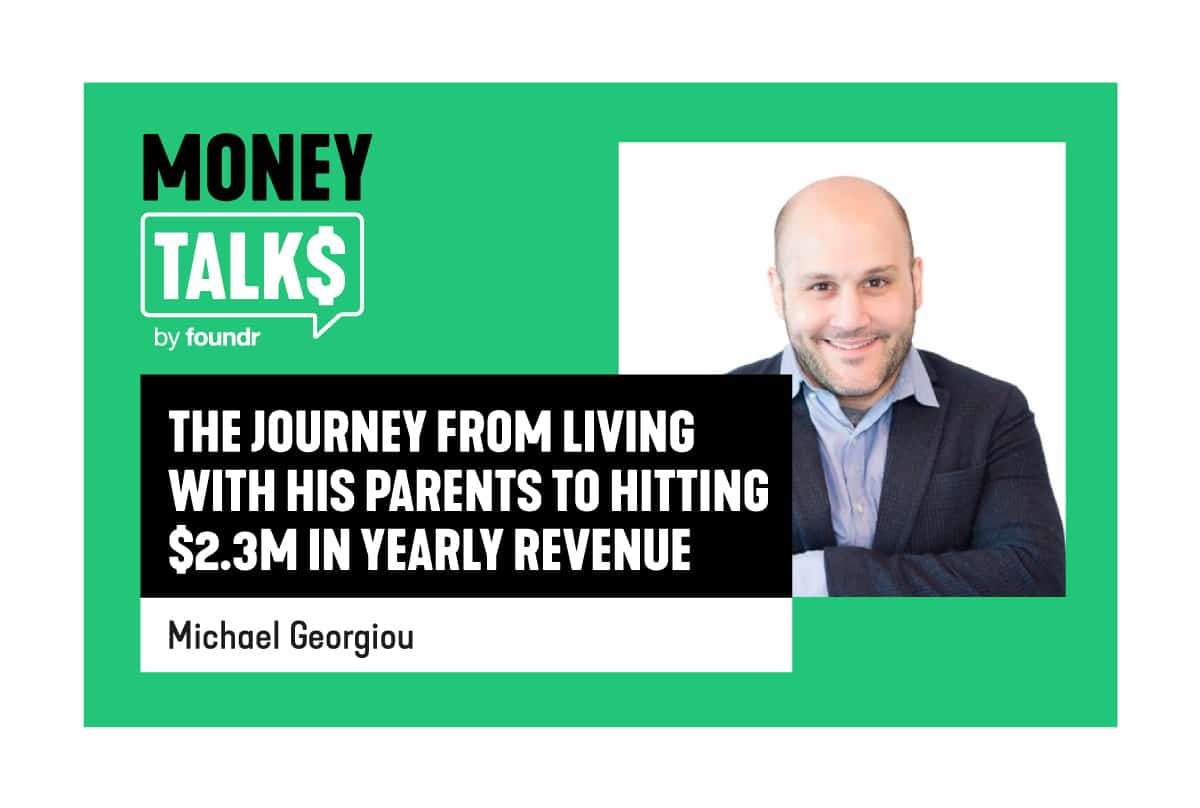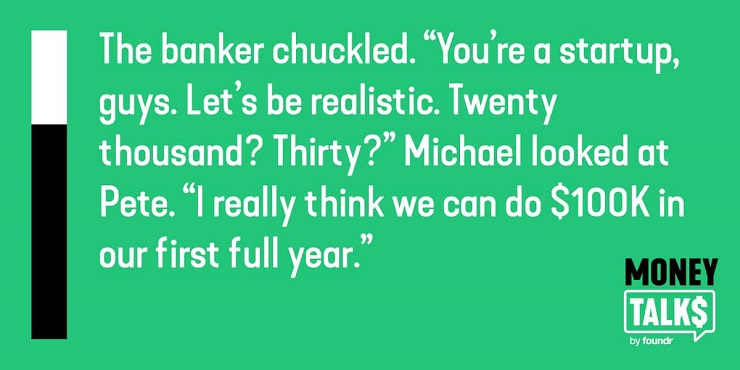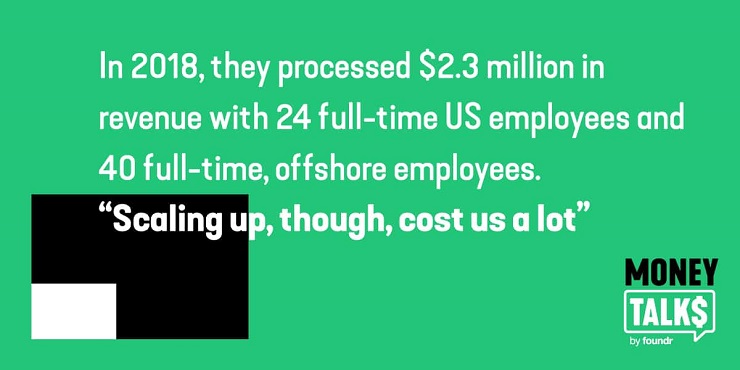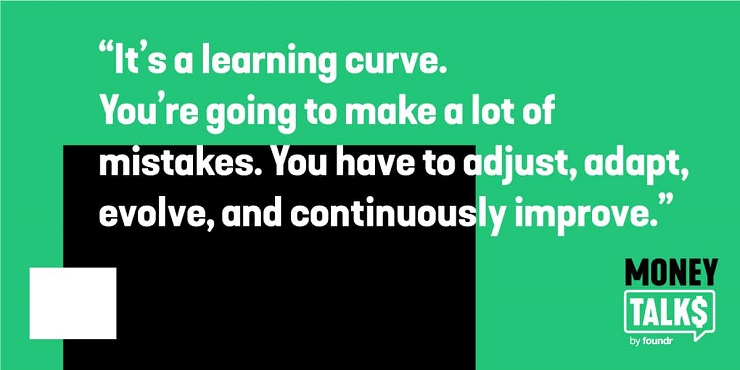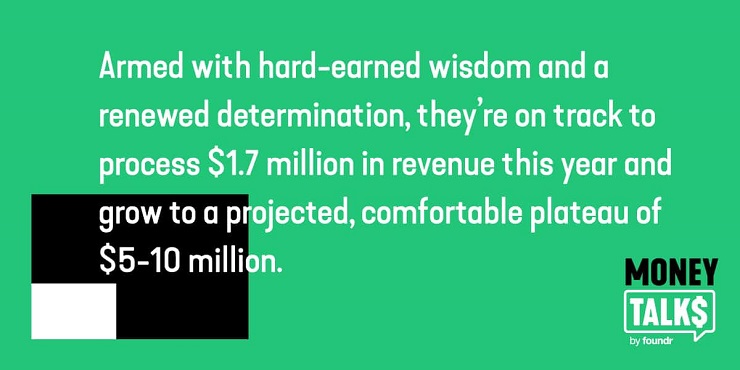Let’s talk money, shall we? In our recurring series Money Talks, we challenge entrepreneurs to be brutally honest about their financial situations—their investments, their profitability (or lack thereof), their money highs and money woes. We’re asking the tough questions and not holding anything back.
In this edition, we get real with Michael Georgiou, who went from unemployed and living with his parents to building a multimillion-dollar company with his brother-in-law. Today, their company Imaginovation is in a “scale-back to grow again” phase, as they work to improve their tight profit margins. Michael gives us the details.
EXCLUSIVE FREE TRAINING: Successful Founders Teach You How to Start and Grow an Online Business
MICHAEL GEORGIOU
Company: Imaginovation
Niche: Custom apps for businesses
Time in Business: 8 years
Cost to Start: A few hundred to incorporate
Key Figure: Topped $2.3 million in revenue during 2018
In a Nutshell: Launched in late 2011, Michael Georgiou and his partner Pete Peranzo built Imaginovation, a company that creates custom apps for businesses. The 24-year-old worked and lived out of a bedroom in his parents’ home for the first five years. Pete kept his day job and worked on their company from 5 p.m. until midnight during the week. Both worked weekends. Their revenue peaked at $2.3 million in 2018, but they’ve struggled to build up their profit margin. They’ve currently scaled back to a projected $1.7 million in revenue and are making plans to grow again—smarter and better prepared.
From London to Cyprus, Canada to America
Michael was born in London and then moved to Cyprus, the Greek island his parents were from. More moves resulted in him mainly being raised in Canada and then North Carolina. His multicultural background created both a love of his Cypriot homeland and pride in building an American company from nothing. He earned his bachelor’s in public relations and marketing from the University of North Carolina at Pembroke and his master’s in business communications from Bond University in Australia.
At 24, Michael was living the glamorous life of sending out resumes from an upstairs bedroom of his parents’ home. That’s until Pete, who would later become his brother-in-law, came to him with an idea.
Did Michael want to build a company with him, creating custom apps and websites for businesses? Pete—a programmer and coder—would handle the creation of the products, while Michael would handle advertising, marketing, and sales. They’d be 50/50 partners.
Michael jumped at the idea.
Their first expense was a few hundred dollars to incorporate “Imaginovation, LLC” with the State of North Carolina. Michael went straight to work aggressively marketing the company to any and all potential clients. So aggressive, in fact, that Craigslist banned him at least three times from promoting on the site.
“There’s always a way around a challenge like that, though,” Michael says. “Always a way to achieve the goal and be successful. There is no room for excuses.”
In the third week after starting Imaginovation, Michael closed a $10,000 deal for the company. They were to create a music web app for a client in Charlotte, North Carolina.
“That was the pinnacle moment we knew this could be something real,” Michael says. “Something great.”
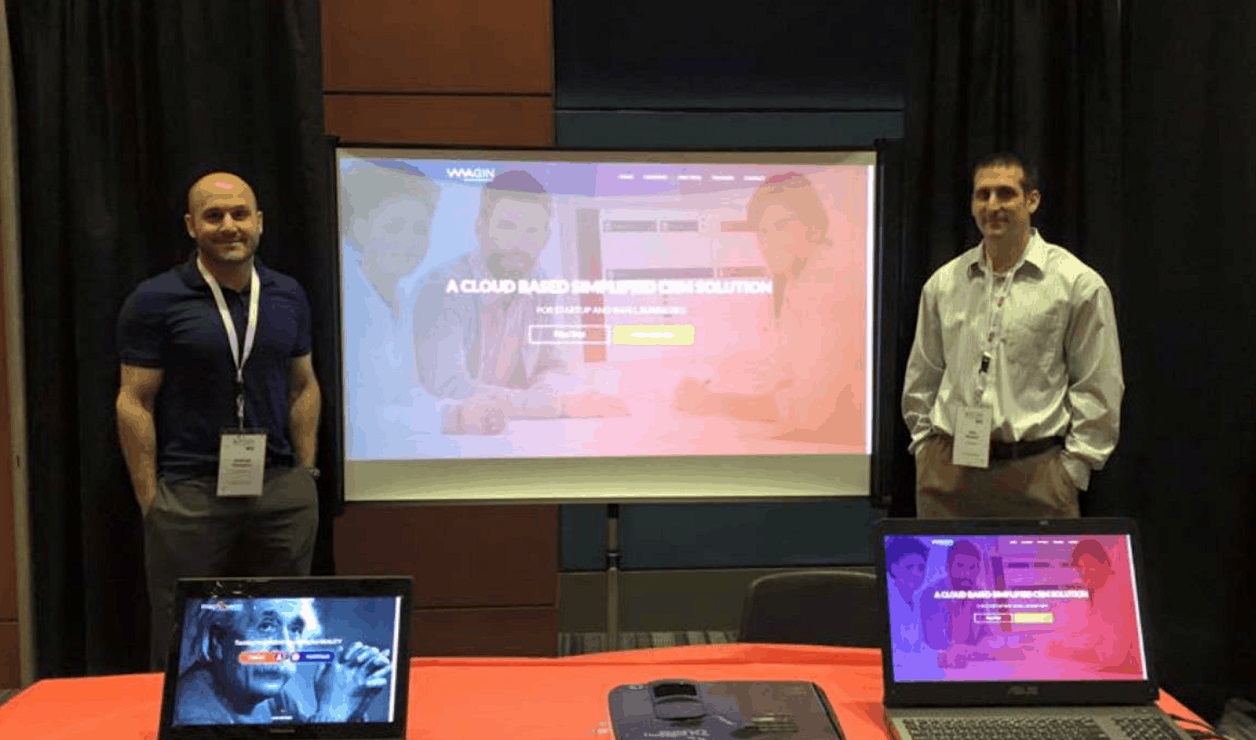
From $10,000 to $100,000 and Beyond
That initial $10,000 contract did not immediately beget more business. While Pete and his team of web developers went to work building the app, Michael kept up his guerilla and digital marketing tactics, frequently toiling away in his bedroom until 3 or 4 in the morning.
While the budget on paper said he would earn $1,200/month, he often went several months without taking a full or even partial salary so the business had money to operate and expand.
In one memorable early moment, Michael and Pete went to the bank to open their business credit card account, and were asked about how much they projected in revenue for year one.
Michael didn’t hesitate. “One hundred thousand,” he said.
The banker chuckled. “You’re a startup, guys. Let’s be realistic. Twenty thousand? Thirty?”
Michael looked at Pete. “I really think we can do $100K in our first full year.”
Sure enough, by the end of 2012, they broke $100,000 in gross revenue.
And it didn’t stop there.
They kept testing out new ideas, services, and marketing approaches with clients. For a while, they added custom websites, SEO, marketing, content marketing, video production, 2D and 3D animation, onsite videography, and social media marketing alongside custom mobile and web app development. Their revenue grew 40% each year.
“It was unscalable, though,” Michael says. By 2016, the company was spread too thin. “It was too hard to do all of that in-house (digital marketing and development). We decided to focus on our own marketing and just build custom applications for companies.” They scaled back to their core business and, by the end of 2016, surpassed $1 million in revenue for the first time.
From 2016 through 2018, the company kept its hardcore focus on building apps. They signed bigger and more long-term contracts. They converted contractors into full-time employees, recognizing that it was better for Imaginovation to have dedicated employees than contractors, whose attention would be divided.
Their leadership, marketing, sales, project management, and some development stayed stateside. The core of developers remained off-shore, where the talent pool is large and the labor costs are lower. In a brilliant move, they decided to pay their off-shore developers a lot more to keep US business hours, since all of their clients are based in the States. This enabled Imaginovation to react quickly to client questions and issues instead of waiting out the time difference for communication.
In 2018, they processed $2.3 million in revenue with 24 full-time US employees and 40 full-time, offshore employees.
“Scaling up, though, cost us a lot,” Michael says.
Big Revenues, Small Profits
Michael and Pete were learning in real time that eye-popping revenues for a startup don’t always translate to a financial windfall.
All those new contracts required more developers and project managers. The increase in labor costs ate into their bottom line. As a result, despite the giant revenue number, the company only experienced a little more than $100,000 in profit in 2018. The duo found themselves, once again, wondering if they were going to get paid.
“Imaginovation is my baby,” Michael says. “It really is like raising a child. You start from nothing and you nurture it, give it everything—your love, your passion—but it’s a lot of struggle, too. Worrying about, ‘Will I be able to pay my bills next month?’ Your employees get their paychecks, but you don’t. It’s a grind. It’s a hustle.”
When they parted ways with a bigger client toward the end of 2018, the brothers-in-law realized they were entering into a new phase of Imaginovation. They sat down with their accountant and had hard conversations about expenses, revenue, and profit.
“It’s a learning curve,” Michael says. “You’re going to make a lot of mistakes. You have to adjust, adapt, evolve, and continuously improve.”
8 Years of Growth, 6 Hard Lessons
With nearly eight years of experience behind them, Michael and Pete have learned some hard lessons.
1. Don’t assume a friend who is awesome will make an awesome employee.
2. Pay attention to expenses versus income. More work doesn’t necessarily equal more profit in a service-based business. “Now we’re focused on controlling our expenses better so that revenue reaps greater profit.”
3. Aim for work-life balance. Michael now does salsa dancing and boxing in his consciously created downtime. All employees work from home on Wednesdays.
4. Beware of setting up a situation where staff must divide their attention between departments. “It’s not easy for a founder of the company to manage both the sales team and the marketing team. Sales and marketing should definitely be connected and communicating, but they’re two different worlds for a reason…I can’t tell you how many times I’ve gotten sick from anxiety and exhaustion in trying to do everything while running a business and scaling it up.”
5. Recognize the importance of marketing for growth. “In order for the tech side to grow, in order for us to hire better and more developers and to have more efficient and streamlined cost-saving tools, you need to increase sales. In order to increase sales, you need to increase leads. In order to increase leads, you’ve got to market. It’s all tied together.”
6. Pay attention to your website. At Imaginovation, 90-95% of sales over the life of the company came through Google. “We’ve closed million-dollar deals because of Google,” Michael says.
Was All the Stress and Effort Worth It?
“I’ve had nightmares. The times that we’ve struggled. Between Pete and me, we’ve threatened 100 times over the years to quit, that we can’t keep doing this. But then Pete picks me up or I pick him up and we’re like, you know what, man, let’s do this. Life is short. We’ve done all this work. We’ve built the foundation. It’s there. Let’s keep going. We can make this into a great company.”
Armed with hard-earned wisdom and a renewed determination, they’re on track to process $1.7 million in revenue this year and grow to a projected, comfortable plateau of $5-10 million.
“It’s a mental, spiritual, and emotional shift in your body that you have to adjust to,” Michael says, when considering the current transition period. “You feel like, ‘Man, all that work we did, we were at this point and now we’re smaller because it didn’t work out the way we wanted it to work out.’ Life happened. Stuff happened. You shift. I haven’t lost my passion.”
They are sticking with their core service: creating custom applications for businesses. Each app runs $50,000-$200,000. They listen closely to each client’s needs and desires, then craft a custom solution. Sometimes, the plan incorporates elements of the past. “When you build a mobile or web app, or even a website, incorporating video into that product increases the user experience and conversion, which ultimately means more leads and sales. We still understand those processes of production, so we can offer that service as an add-on.”
As they navigate the current challenges, income and expense battle it out each month. They’re currently spending $80,000-$100,000 per month, most of it on employees. Monthly income is $80,000-$100,000. It fluctuates due to the way their contracts are written and sold.
Michael Gets Real
It isn’t often that an executive in the midst of a transition at his company is willing to be as candid as Michael. But he believes in what he’s done and what he’s doing. He’s happy to share, firm in his belief that it might help another entrepreneur along the way.
“Emotionally, I’m happy where I am,” he says. “I’d like to be more financially healthy, in order to create opportunities. The business has made me a tougher person, though. It’s made me confident and introduced me to amazing people. Where I am now has allowed me to figure out more of my purpose for my career, what I want to do. It’s given me so much knowledge, insight, intelligence, and experience.”
All those ups and downs from the past eight years have only contributed to his own unique story as an entrepreneur, and given him much more confidence and courage.
“I don’t know if I’d know who I am as much as I do right now if I hadn’t gone through what I’ve gone through with Imaginovation.”
And has he learned how to handle those hard times? Does he have any advice for the rest of us out here, keeping those late hours, facing challenge after challenge? Absolutely.
“When you have this mountain of problems—a vast array of different issues going on—it comes down to looking at the long-term vision and purpose of what you’re doing,” he says.
We all have a natural tendency to be too negative, or be too hard on ourselves. Michael recommends you take a minute, breathe, remember all you’ve accomplished, and shift your mindset.
“That’s what helped me in my days of mountains. It was so hard and so stressful. I would talk to myself and just turn the negative into a positive. You’ll be surprised what happens when you do that. It’s crazy. Put the words out there. Talk to yourself. It works.”
If you’d like to hear more of what Michael has to say, check out his podcast, “Tales from the Pros.” You can also read about scaling up without burning out here and what five other startup CEOs had to say about avoiding burnout in this article.
EXCLUSIVE FREE TRAINING: Successful Founders Teach You How to Start and Grow an Online Business
MICHAEL GEORGIOU
Your Turn
Do you understand the kinds of things Michael has lived through in building Imaginovation? Has your business grown, only for you to realize you had to scale back to find lasting success? What do you think of Michael’s experience and approach? I’d love to read your thoughts in the comments below.
Subscribe here to be notified when we drop the next Money Talks article.
